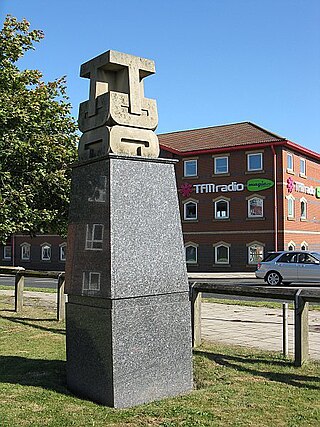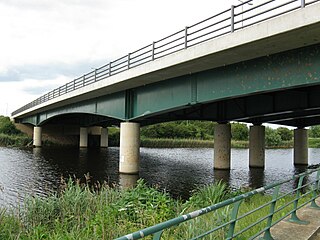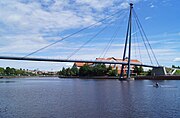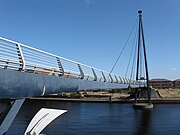
The Millennium Bridge, officially known as the London Millennium Footbridge, is a steel suspension bridge for pedestrians crossing the River Thames in London, England, linking Bankside with the City of London. It is owned and maintained by Bridge House Estates, a charitable trust overseen by the City of London Corporation. Construction began in 1998, and it initially opened on 10 June 2000.

The River Tees, in Northern England, rises on the eastern slope of Cross Fell in the North Pennines and flows eastwards for 85 miles (137 km) to reach the North Sea between Hartlepool and Redcar near Middlesbrough. The modern day history of the river has been tied with the industries on Teesside in its lower reaches, where it has provided the means of import and export of goods to and from the North East England. The need for water further downstream also meant that reservoirs were built in the extreme upper reaches, such as Cow Green.

Stockton-on-Tees, often simply referred to as Stockton, is a market town in County Durham, England. It is governed by a unitary authority borough named after the town, which is part of the devolved Tees Valley area.

The Hungerford Bridge crosses the River Thames in London, and lies between Waterloo Bridge and Westminster Bridge. Owned by Network Rail Infrastructure Ltd it is a steel truss railway bridge flanked by two more recent, cable-stayed, pedestrian bridges that share the railway bridge's foundation piers, and which are named the Golden Jubilee Bridges.

The Lune Millennium Bridge is a cable-stayed footbridge which spans the River Lune in Lancaster, England.

The Tees Barrage is a barrage and road bridge across the River Tees, Northern England, just upriver of Blue House Point and is used to control the flow of the river, preventing flooding and the effects of tidal change. It is between the towns of Stockton-on-Tees and Thornaby, road access is only by the latter with limited road access to the Tees's north bank.

Kingsgate Bridge is a striking, modern reinforced concrete construction footbridge across the River Wear, in Durham, England. It is a Grade I listed building. It was personally designed in 1963 by Ove Arup, the last structure he ever designed. Kingsgate Bridge connects Bow Lane on the historic peninsula in the centre of Durham to Dunelm House on New Elvet, and opened in 1966. Kingsgate Bridge is thought to have been one of Arup's favourite designs of all, he having spent many hours working on every detail of the plans.

The Denver Millennium Bridge is the world's first cable-stayed bridge using post-tensioned structural construction. Its 200-foot white tapered steel mast rises above Denver's northwestern skyline, connected to the bridge deck and foundation anchored by steel cables. The footbridge crosses railroad tracks and the regional light rail system, climbing no higher than 25 feet above street level, thereby minimizing the height pedestrians must climb.

The Tees Barrage International White Water Course, originally the Teesside White Water Course, is an artificial whitewater course on the north bank of the River Tees, in northern England. It is part of the Tees Barrage and is located in the Stockton-on-Tees district, accessible by road only from Thornaby-on-Tees and best accessed by the A66. The course was built in 1995 at a cost of £2 million. The course is now open once more under the new name TBIWWC.

The Hulme Arch Bridge in Hulme, Manchester, England, supports Stretford Road as it passes over Princess Road, and is located at grid reference SJ838968. The construction of the bridge formed part of the regeneration of the Hulme district of Manchester, both by re-establishing the former route of Stretford Road, which had been cut into two halves by the construction of Princess Road in 1969, and by providing a local landmark. The location was previously occupied by a footbridge.

The A19 Tees Viaduct or Tees Flyover is a high level six-lane dual carriageway road bridge in the North East of England carrying the main A19 trunk road north–south across the River Tees.

The Infinity Bridge is a public pedestrian and cycle footbridge across the River Tees in the borough of Stockton-on-Tees in northern England. The bridge is situated one kilometre downriver of Stockton town centre, between the Princess of Wales Bridge and the Tees Barrage. It connects the Teesdale Business Park and the University of Durham's Queen's Campus in Thornaby-on-Tees on the south bank of the Tees with the Tees Valley Regeneration's £320 million North Shore development on the north bank.

Teesdale Business Park is a major business park on the former site of Head Wrightsons' Teesdale works in Thornaby-on-Tees, North Yorkshire, England. The park was redeveloped by the Teesside Development Corporation. The area is immediately north of Thornaby railway station.

The Princess of Wales Bridge, sometimes referred to as the Diana Bridge or the Princess Diana Bridge, is a dual carriageway road bridge named after the late Diana, Princess of Wales. It carries Council of Europe Boulevard across the River Tees, Northern England.

The Jubilee Bridge is a road and pedestrian/cycle bridge carrying the Queen Elizabeth Way north-south across the River Tees in the borough of Stockton-on-Tees, northern England. It links Preston-on-Tees with Ingleby Barwick. The bridge is over 3.1 miles (5 km) upriver from, and over 1.9 miles (3 km) approximately south of Stockton town centre.

The Victoria Jubilee Bridge, also known as Victoria Bridge, is a road bridge carrying Bridge Road (A1130) east west across the River Tees between Stockton and Thornaby in Northern England. Commonly referred to as the Victoria Bridge, it is located just south east of Stockton town centre and in the town's namesake borough.

Expedition Engineering is a London-based consulting firm, delivering structural engineering services.
Christopher Mark Wise is an English academic and engineer. Wise began his career with Ove Arup and Partners in 1979. After working in UK, Australia and US, he became Arup's youngest Director in 1992, and later became one of five Board Directors responsible for Building Engineering's 500 engineers and support staff. In 1999 he left Arup and co-founded Expedition Engineering together with Seán Walsh.

The Surtees Rail Bridge is a rail bridge on the Tees Valley Line over the River Tees in the Borough of Stockton-on-Tees. The bridge is south of Stockton-on-Tees town centre and just north of the adjacent Surtees Bridge which carries the A66 road. The bridge is built on the site of a series of Tees Bridges alternating between two adjacent crossing sites.

The Byker Viaduct is a 2,674 ft (815 m) curved 'S' shaped light railway bridge, which carries the Tyne and Wear Metro over the River Ouseburn in Newcastle upon Tyne. It carries the line from Manors Metro station in the city centre to the west, to Byker Metro station in the area of Byker to the east, over the lower Ouseburn valley, with the river emptying into the north side of the River Tyne, to the south.
























